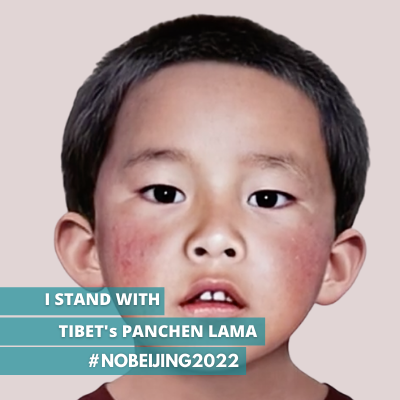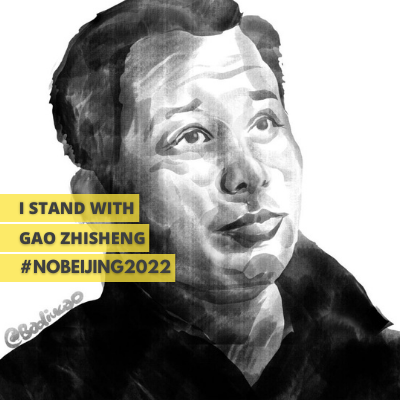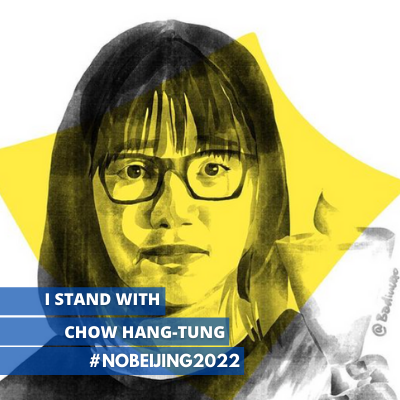Guidance for Athletes at Beijing 2022 Winter Olympic Games
The Beijing 2022 Winter Olympic Games (4 – 20 February) are taking place within a context of worsening human rights abuses perpetrated by the Chinese state. More than 10 governments have announced they will be boycotting Beijing 2022 because of the serious human rights situation. Athletes and journalists who choose to go to Beijing are strongly recommended to ensure they are fully briefed on the current situation and take steps to understand the risks and implications for their freedom of expression and security. This guidance has been prepared by campaigners working for freedom and human rights for Tibetans living in Chinese-occupied Tibet.
Human Rights Situation Overview:
Since the 2008 Beijing Summer Olympics, human rights abuses across all regions under Chinese rule have spiraled into an abyss. Extensive evidence highlights the government’s systematic use of torture and suppression of human rights defenders, excessive use of force against peaceful protesters, and large-scale arrests of journalists, women’s rights activists, and lawyers, and a crackdown against the LBGTQ+ community. Freedom and democracy in Hong Kong have been entirely dismantled; Tibet is completely sealed off from the outside world and Tibetans live under extreme repression; and state-led genocide and crimes against humanity—the gravest human rights abuses under international law—including mass detentions, torture, sexual abuse, and persecution are being carried out against Uyghurs and other Turkic Muslims.
Athletes as Allies:
From the 1936 Olympic Games in Nazi Germany to Beijing’s last Olympics in 2008, sport and politics have always been uncomfortable bedfellows, but boycotts over apartheid in South Africa and the black power salute by Tommie Smith and John Carlos during the 1968 Mexico City Olympics are defining moments in history. Today, taking a knee before sporting events has become a common occurrence. At the Tokyo Olympics, Gwen Berry (US hammer thrower) raised a fist to protest racial and social injustice. Raven Saunders (US silver medallist in the shot-put) raised her hands and crossed them in an X – “the intersection of where all people who are oppressed meet” – during her medal ceremony.
In advance of the Tokyo 2021 Summer Olympics, the International Olympic Committee published new rules and regulations intended to clarify “opportunities for athlete expression during the Olympic Games”. According to the New York Times, the new rules would tolerate, for example, an athlete wearing a shirt with a slogan or raising a gloved fist or kneeling, if it happened before the start of a competition, including during athlete introductions. However the IOC says expressions (or gestures) must not be targeted “directly or indirectly, against people, countries, organisations and/or their dignity.” The guidelines further state, more ambiguously “When expressing their views, athletes are expected to respect the applicable laws”. A group of 150 athletes protested against these IOC rules.
What can Athletes do to prepare?
- Contact human rights groups to seek information about the situation in Tibet, East Turkistan, Hong Kong, and China. See suggested organisations below.
- Urge your National Olympic Committee for a complete briefing about the human rights situation in China and guidelines concerning your own personal safety, for example how to react if followed by minders.
- Don’t Be Afraid – Be Prepared: Freedom of Expression is enshrined in the Universal Declaration of Human Rights. Don’t let the Chinese authorities intimidate you or make you doubt that your rights should be respected.
- Develop a personal strategy to stand up for human rights when you are at the Games. Athletes should be aware of IOC rules in order not to be intimidated by officials with an arbitrary interpretation. You should also ensure that you are not seen to be endorsing or supporting the covering up of human rights abuses by the host country. We advise you to make yourself aware of compromising situations, including photo opportunities with Chinese officials or requests to be pictured alongside people wearing costumes of oppressed “minorities,” or political slogans in Chinese.
- Read the Digital Security Recommendations below.
How Can Athletes support communities affected by China’s human rights abuses? Before, during and after the Games
- STAY AWAY FROM THE OPENING AND CLOSING CEREMONY: These ceremonies will be used by China to gloss over extreme human rights abuses and offer a false representation to the world that there is no genocide against the Uyghurs, occupation in Tibet or a crackdown against freedom and democracy in Hong Kong.
- Speak out against human rights abuses – Your silence is their strength. Show support for Tibetans, Uyghurs, Hongkongers, and Chinese freedom activists. You can do this by:
- Taking a stand in solidarity with affected communities
- Sharing information on your social media streams
- Meeting with affected communities in exile ahead of your visit
- Give your voice to those who have been silenced. You can do this by:
- Agreeing to have a Social Media Takeover – grant posting privileges to a Tibetan, Uyghur, Hongkonger individual or group so they can post information about their situations.
- Agree to take part in a social media ‘live’ to discuss the situation and share your support with your fans
- Change your profile picture to a political prisoner who’s been targeted by Chinese authorities. You could choose:
- Dedicate your medal to communities affected by human rights abuses. You can do this by:
- Speaking to the media about your concerns and dedicating your medal to Tibetans, Uyghurs, Hongkongers, and Chinese freedom activists
- Share information about your dedication on your social media channels
Digital Security Recommendations:
Although China and the IOC promise a free and open internet inside the Games’ closed loop, the degree of China’s control of the internet means you should assume you will face restrictions and your devices and online activity will be monitored. For instance, a new report has found serious security flaws in the Beijing 2022 ‘My2022’ smartphone application that’s required for athletes and team officials that leave users at risk of having their calls and data intercepted.
The Committee for the Protection of Journalists (CPJ) advises that you should:
- Assume your hotel room is under surveillance and that conversations may be subject to eavesdropping. Calls made using a hotel landline or cell phone are not encrypted and can be intercepted.
- Keep your devices with you at all times and avoid leaving them unattended in your hotel room, etc.
- Be aware that Chinese officials may monitor social media and take offense at comments or activities that could be construed as being critical of China.
Preparation: Phones and laptops could be contaminated with malware while in China, and CPJ recommends leaving these at home and using an old phone and/or laptop for the trip.
- Wipe old devices before you travel (remember to back up first). Delete anything inessential and install or update essential apps and services immediately before travel to make sure you have the latest software.
- Prepare your devices for airport security and border crossings following guidance in CPJ’s Digital Safety Kit.
Data and accounts: Your online accounts hold a lot of information about you – including your work, your sources, and your family – so plan to use as few as possible on your trip.
- Consider creating a new email account specifically for China. Avoid logging into your regular work services like email completely in case the content is exposed.
- Limit which social media and messaging platforms you will use to those that are essential for contacting work or family. Consider having a backup way to reach people in case one does not work in practice.
- In case of restrictions, ask colleagues in China which apps and Virtual private networks work best. China has technically banned unlicensed VPNs so this could be used against you if officials are looking for an excuse to penalize you.
- Avoid installing the Chinese app WeChat, since it is likely to collect a lot of data, including messages and calls.
- Review accounts on essential services you need to use and remove content you would not want others to see, such as contacts for sensitive sources, or personal photos and messages. (See CPJ’s guide to removing personal data from the internet.)
- On returning home, change passwords on accounts accessed from China. Monitor accounts/devices for unusual activity and seek IT support if you have concerns.
See also CPJ advice about the use of the mandatory COVID-19 App and QR codes.



